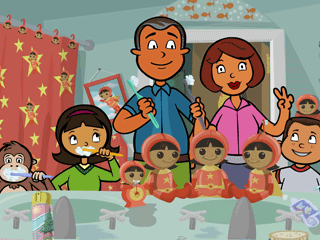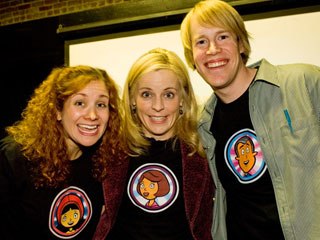PBS children's series WordGirl isn't your average ponderous educational show: its heroine uses plucky charm in a retro setting to defeat villains with her word power.
Feeling down in the dumps about your lack of useful vocabulary? Get confused about whether to use "indignant" or "indigo"? Never fear, WordGirl is here! Now in its second season on PBS KIDS GO!, WordGirl is a fast-paced action adventure superhero show in which the hero has the extraordinary power of... words. Becky Botsford, fifth grader turned superhero, uses vocabulary to defeat quirky villains, and premiered as a half-hour show in September 2007.
A Scholastic Media show created by Dorothea Gillim (formerly of Soup2Nuts), WordGirl features the voices of Jeffrey Tambor, Tom Kenny, Dannah Feinglass, Maria Bamford and Chris Parnell, among many others all known for their comedy and improv skills. Where other educational shows, especially notable PBS ones, can drag, WordGirl zips along, fighting villains and teaching its target 6-to-8-year-old audience words like "timid," "hullaballoo" and "indignant" at a breakneck pace.
"If you want someone to learn something, there is a rule of three. The word is introduced in conversation and then it's defined by WordGirl and then it's used in context. And so to do that and not be didactic and not be boring you have to have a fast-paced show when you're repeating something over and over again," says Exec Producer Deborah Forte, also the creator and president of Scholastic Media.
Forte sees WordGirl as the culmination of 15 years of work, starting with the debut of The Magic School Bus in 1994. Sesame Street may claim the title as the first educational show for children that combined learning with entertainment, but Magic School Bus' debut ushered in an era where education and animation were not considered mutually exclusive. "I think it's the entertainment that comes first," Forte says. "Because the beauty of the show is that it is designed so that any story you want to tell, anything you want to have a character do, you can always use a word. And so it's so open ended; the curriculum and educational objective is not at all constricting to the entertainment. The writers can go so many places with the story ideas and get as ridiculous as they can and we can still fulfill on our educational promise."
The Magic School Bus was also the first animated show to utilize celebrity talent, featuring Lily Tomlin and Malcolm-Jamal Warner in key roles. Add that in with Soup2Nuts' experience with animated sketch comedy (Dr. Katz: Professional Therapist, Squigglevision, Home Movies and Time Warp Trio), and you get the creation that is WordGirl.
Entirely created in Flash and done in-house at Soup2Nuts' Boston studio, WordGirl has a retro feel that is a product of the years of superhero and offbeat animated shows that have come before it. "We wanted everyone to take it seriously; even the music is very serious, kind of superhero-ish music, that makes it more of a spoof when you play it straight. At a certain point it kind of turns on itself," says Gillim, co-creator and former exec producer.
Gillim was the type of kid who asked for a dictionary for Christmas when she was in the ninth grade. "It couldn't just be any old dictionary it had to be the Random House Unabridged Dictionary and I didn't read it cover to cover, but I'd mark the words I looked up, so I've always been a word geek," Gillim says. "I've always admired people who had that ability and I thought, wouldn't it be cool if eloquence was a super power? I was looking around kids TV and I realized what was missing was a really strong role model girl. And I thought, wouldn't it be cool if this superhero was just a 10-and-a-half-year-old-girl? And then I remembered educational shows from my youth like Electric Company and Bugs Bunny [shorts, even though] it's not known as an educational show... [I remember the word] 'indefatigable'; that was a word I learned from Bugs Bunny."
Gillim originally came up with the idea in 2002, and was trying to find a home for her creation when she and her team pitched at PBS Kids in 2005. "At the time we weren't consciously trying to pitch a faster-paced show, we were commissioned to do two-minute shorts. So we had pack a lot into two minutes. It just so happens that it was kind of accidental that it turned out to be a faster-paced show, however, relative to what's on PBS. However, everyone was pleased with the outcome. On a number of levels it worked. And I think that we live in a much more sped-up world. Our target audience is 6-8 [years old] and that's really on track for where they are in terms of pacing and processing, so PBS was very responsive, they just loved it from the get-go," she says."
There are words that just don't work, though. Gillim says their educational consultant, Beth Rabin, sometimes rejects words. A word they had to discard was “indubitably," which is a very Sherlock Holmes, cool word, but it's nothing that the average 7-year-old will ever come across in their lives. Another one that didn't work back when the show was in its two-minute short life was "pompous."
Gillim says, "I didn't think was such a stretch but when we focus-tested it, it was interesting because, when kids are 6 to 8, they don't have the cognitive framework to know social stratification. They're not aware. They just love everybody. They just didn't have the mental framework to understand it. and it goes back to a rule of our criteria, which is that you have to be able to use language that kids will understand. And it's not just the language but developmentally what they're ready to take in. so that was kind of an eye opener for me."
WordGirl was influenced not only by Gillim's word love but 1940s-era Mighty Mouse shorts and early animated TV shows from the 1960s like The Jetsons. "The look is very retro, we have kind of this rule that there's no technology; we try to keep the technology to a minimum. WordGirl does have a cell phone but it looks like it was made in 1995. So that's sort of the reference for the look."
WordGirl's cast of talent includes some of the best improv and comedic actors around, and the show is about a quarter improvised, Gillim estimates. "We got started with Dr. Katz on Comedy Central and we'd done kids shows, adult shows, but the common denominator is always comedy and usually improv. A lot of the talent that appear in WordGirl we've worked with in other productions, like Tom Kenny and Fred Stoller, for example," Gillim continues. The producers were originally after Reese Witherspoon to play the part of WordGirl, but when time ran out, they tapped Feinglass to play the part. "I knew that she was capable but originally the intention was that she would come in and work as a placeholder but when I heard her, I said, 'Forget Reese Witherspoon.' I mean, she nailed the part like no other. She brings such pluck and such intelligence to the role. And when I introduce her and call her 'One Take Feinglass,' I'm not kidding you. She's such a pro. That was a case of a happy accident," Gillim adds.
Parnell was chosen as the narrator for his "effortless irony," Gillim says. And the villains' voices were ones that sounded inherently funny, "so that it takes any potential threat out. Kids think of them as silly characters, not scary characters. We try to humanize them too so that it's not so black and white. They're more interesting characters that way anyway," she explains.
The show's producers are still waiting to hear if they have a third-season pickup from PBS, although Forte says she's very optimistic. A distribution deal for DVD release in the U.S. is also being worked out, although episodes of the show are available for download on iTunes. There are also thoughts of how to make the show go across platforms, including cell phone "word of the day" downloads. Gillim also has left Soup2Nuts for WGBH-TV in Boston, but the show remains in the hands of producer Danielle Gillis.
"When I'm asked what the target audience is, it's really the SpongeBob audience, which is 4 to 84," Gillim concludes. "We have young kids who watch the show, the 3 and 4-year-olds and then we have the teenagers who were fans of our other shows who sort of discovered it on their own. Hipster 20-year-olds are starting to discover it and then of course parents are just as rabid fans as their kids. There are a few great family shows out there and then also it's good for the learning because kids and parents are watching it together. And hopefully the learning continues on after the show."
Annemarie Moody is the news editor of AWN and VFXWorld.












